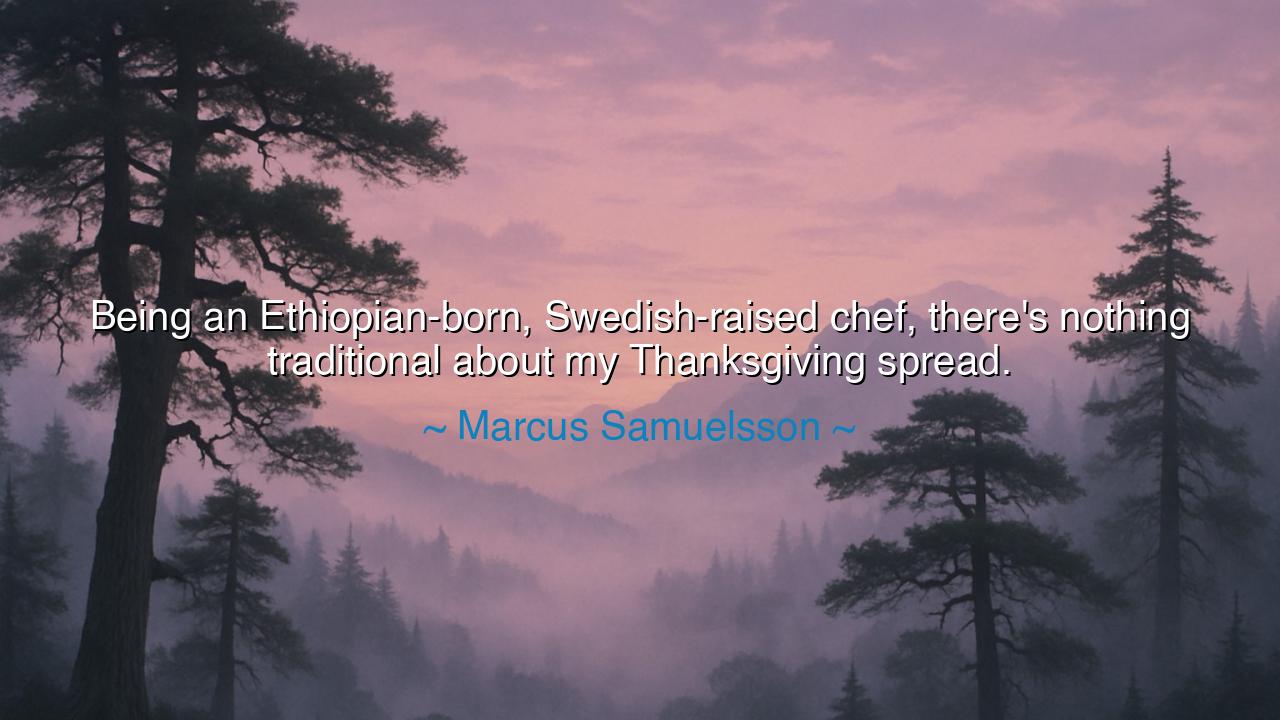
Being an Ethiopian-born, Swedish-raised chef, there's nothing
Being an Ethiopian-born, Swedish-raised chef, there's nothing traditional about my Thanksgiving spread.






Marcus Samuelsson, with words full of candor and pride, once declared: “Being an Ethiopian-born, Swedish-raised chef, there's nothing traditional about my Thanksgiving spread.” In this brief reflection lies a great truth about identity, heritage, and the way tradition itself is reshaped by the journeys of human life. His statement speaks not merely of food, but of the blending of cultures, the weaving together of distant homelands into a single table of belonging. For Samuelsson, Thanksgiving is not bound to the strict forms of turkey and stuffing—it is the canvas upon which his life’s story, from Ethiopia to Sweden to America, is painted.
The origin of his thought is rooted in his own remarkable journey. Born in Ethiopia, orphaned, and later adopted by a Swedish family, Samuelsson was shaped by the flavors, customs, and rhythms of Scandinavia. Later, through his career as a chef, he became a bridge between continents, carrying African spices, Nordic traditions, and American customs into harmony. His words remind us that tradition is not fixed stone, but living fire—it takes the form of the hands that tend it, and it glows differently in each home it inhabits.
History offers us many mirrors of this truth. Consider the pilgrims themselves, who in 1621 celebrated the feast we call the “first Thanksgiving.” They were far from their homeland of England, surviving in a new and unfamiliar land, and they shared food not from English tradition, but from what the Native Americans offered—corn, venison, and local harvest. That very first Thanksgiving spread was already a blending, a mingling of old and new. Samuelsson’s modern interpretation is not a departure from the essence of Thanksgiving, but a continuation of its original spirit: adaptation, inclusion, and gratitude.
His words also reveal the deeper meaning of belonging through food. For immigrants and their children, meals often become the most tangible link between past and present. A dish flavored with berbere spice, a loaf of Swedish bread, or a plate of American sweet potatoes is more than nourishment—it is memory, identity, and prayer combined. By choosing to embrace his multicultural influences on a holiday often defined by tradition, Samuelsson is showing us that authenticity is not sameness, but honesty to one’s own story.
Consider also the history of America itself: a land built by those who carried with them dishes from Italy, Ireland, Mexico, Vietnam, and beyond. Over centuries, the Thanksgiving table has quietly absorbed these influences. What was once only turkey and pumpkin has become tamales in Texas, macaroni pie in Caribbean homes, kimchi alongside stuffing in Korean-American families. Samuelsson’s words shine light on this larger truth: that the American feast is not uniform, but kaleidoscopic, shaped by every hand that stirs the pot.
The lesson for future generations is clear: do not fear difference, but honor it. If your heritage calls you to add your own dish to the Thanksgiving table, do so boldly. Let your spices speak, let your recipes carry the voices of your ancestors. In this way, the feast becomes not only a remembrance of harvest but a celebration of the diversity that gives life its color. The true meaning of Thanksgiving is not to imitate what has always been done, but to give thanks in your own way, with the flavors that make your story unique.
Practical wisdom flows from this: when you gather, do not only eat what is “expected.” Share the food that is part of your family’s soul. Teach your children why the dish is important, where it comes from, and what it means. Let the table itself become a map of your journey, a testimony to the resilience and beauty of those who came before you. In doing this, you keep their memory alive, and you plant in your children the courage to honor their own identity.
Thus, Marcus Samuelsson’s words rise beyond the kitchen into the realm of eternal wisdom. To live authentically is to celebrate both where you come from and where you are now. Let your Thanksgiving spread—whether traditional or not—speak of your story, your gratitude, and your truth. For in the end, the feast is not about conformity, but about giving thanks in the language of your own life. This is the inheritance you pass on: a table where every culture has a seat, and every story is honored.






AAdministratorAdministrator
Welcome, honored guests. Please leave a comment, we will respond soon